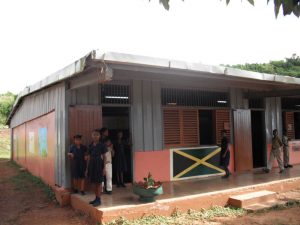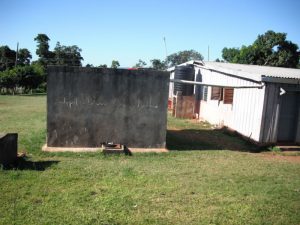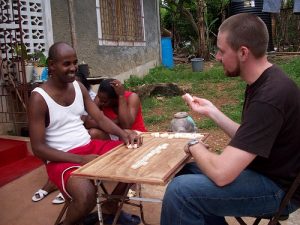 Location
Location
Mt. Airy District, Mocho Mountains, Clarendon Parish, Jamaica
Community Description
Mt. Airy is a small rural upland farming community in the Mocho Mountains of Clarendon Parish, Jamaica. The widespread mining for bauxite (used to make aluminum) in the last half of the 20th century has destroyed much of the prime agricultural land. This, coupled with the effects of climate change (i.e. prolonged drought, severe storms), has left the people without their traditional livelihood, and consequently less self-sufficient.
Even in the absence of extreme weather, research conducted in 2005 for a national sanitation policy shows that 61 percent of Jamaican schools do not have a safe water supply.
Much of Mocho lack piped water, and domestic catchment water is rarely treated. Many residents live in homes that cannot withstand the severe storms that the area has suffered from in recent years.
During these times of crisis, the schools, operating with minimal resources, function as disaster shelters. However, after a hurricane, water from the schools’ catchment tanks is considered unsafe to drink unless treated.
Project Description
This project is to construct a bio-sand water filter, including a concrete platform and necessary plumbing, at the Mt. Airy Primary School in Mocho, Clarendon Parish, Jamaica.
Biosand filters are an appropriate technology that uses sand and gravel to filter water, rendering it potable. This works by both trapping pathogens and sediment and by cultivating beneficial bacteria that consume harmful pathogens. Final sterilization is accomplished with a minimal amount of bleach.

The basic design, including sand grain size and layer thickness, is recommended by the Center for Affordable Water and Sanitation Technology (CAWST). The sand has been donated by a local sand company and is pre-washed and sorted.
The design uses a 50-gallon blue plastic drum to contain the sand. After the water passes through the filter, it will be stored in another 50-gallon drum. This storage drum will be equipped with a pipe to allow easy access to clean water. Lids will also be constructed for the filter and the storage drum.
Rainwater will be harvested from the rooftops. The 50-gallon storage tank will be filled twice daily (in the morning and at night) to provide water to the approximately 250 students, teachers, and staff.
The community will donate all the needed labor for this project, including the transportation of construction materials.
Project funds will pay for the remainder of the construction materials. A minimal amount will be used for informational materials to increase the effectiveness and compliance in the use of the filters.

The project will be incorporated into a community training series sponsored by a local Community Based Organization (CBO), the Mocho Community Development Association (MCDA). To facilitate this, informational brochures for each student and interested community members are included in the project budget.
Project Impact
This project will provide clean drinking water to the students, teachers, and staff at a primary school in Mocho, and will serve approximately 250 individuals.
Also, with this filter, the school will be able to provide potable water to the wider community following any severe storms, when many water supplies are contaminated and when safe water is most needed. Indirectly, this project will also benefit the community, as it will demonstrate bio-sand filtration technology.
A final benefit will be to the MCDA, as its volunteer trainers will gain experience and the organization will boost its community profile.
Peace Corps Volunteer Directing Project
David Engleman
Comments
This is a project that can serve as a demonstration of the effectiveness of technology in Jamaica. As such, it can be replicated by other Peace Corps Volunteers facing similar water filtration problems in the areas in which they serve.
Biosand filters have been shown to be one of the most effective methods for removing drinking water contaminants at the point of service. Proven technology has been modified to meet the local supply sources and needs.
Please use the Donate button below to indicate your desire that your donation is used for this project.
Dollar Amount of Project
$422.25
Donations Collected to Date
$422.25
Dollar Amount Needed
$0.00 – This project has been fully funded, through the generosity of The Soneva SLOW LIFE Trust as a part of their Clean Water Projects initiative.
We encourage others to continue to donate using the Donate button below, and we will notify Peace Corps Volunteer David Engleman of your donation. Additional funds will be used to fund the next project by David and/or those of his counterpart PCVs in Jamaica.
![]() This project has been finished. To read about the conclusion of the project, CLICK HERE.
This project has been finished. To read about the conclusion of the project, CLICK HERE.